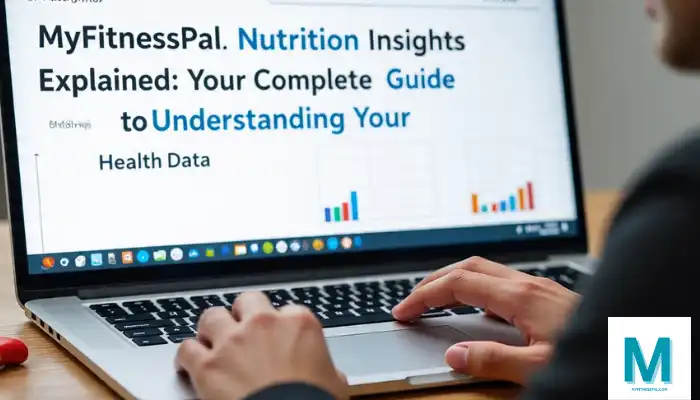By Sophie Lane
Hi everyone! I’m Sophie, and I’ve been using MyFitnessPal for over 2,000 days straight. That’s almost six years of tracking every meal, snack, and sip of water! During this incredible journey, I’ve discovered that MyFitnessPal offers way more than just calorie counting. The nutrition insights feature has completely changed how I understand my eating habits.
Today, I want to share everything I’ve learned about MyFitnessPal nutrition insights and how they can help you make better food choices. Think of this as your friend explaining a really cool tool that’s been hiding in your favorite app all along!

What Are MyFitnessPal Nutrition Insights?
Let me explain nutrition insights in the simplest way possible. You know how your teacher gives you a report card that shows how you’re doing in different subjects? MyFitnessPal’s nutrition insights are like a report card for your eating habits!
Nutrition insights are special reports that MyFitnessPal creates by looking at all the food you’ve logged. They tell you things like:
- Which nutrients you’re getting enough of
- Which ones you might be missing
- How your eating patterns change over time
- What foods are helping or hurting your goals
The best part? You don’t have to do any math or complicated calculations. MyFitnessPal does all the hard work and shows you easy-to-understand pictures and graphs.
My First Experience with Nutrition Insights
When I first discovered MyFitnessPal’s nutrition insights, I was amazed! I had been logging my food for months, thinking I was eating pretty healthy. But the insights showed me some surprising things:
- I was getting way too much sodium (salt) without realizing it
- My protein intake was lower than I thought
- I wasn’t getting enough fiber, even though I ate lots of vegetables
- My eating patterns were completely different on weekends
It was like having a nutrition detective look at my food diary and solve mysteries I didn’t even know existed!
How to Access Your Nutrition Insights
Getting to your nutrition insights is super easy, but the steps are slightly different depending on whether you have the free or premium version:
For Premium Users:
- Open MyFitnessPal on your phone or computer
- Go to the “Reports” section (usually at the bottom of the app)
- Look for “Nutrition Insights” or “Insights” tab
- Choose your time period (week, month, or custom range)
- Scroll through your personalized reports
For Free Users:
Free users get limited nutrition insights, but you can still see:
- Basic macro breakdown (protein, carbs, fat)
- Calorie trends over time
- Some weekly summaries
Types of Nutrition Insights You’ll See
MyFitnessPal offers many different types of nutrition insights. Let me break down the most important ones I use regularly:
1. Macro Nutrient Breakdown
This shows you how much protein, carbohydrates, and fat you’re eating compared to your goals.
| Macro Nutrient | What It Does | My Target | Why It Matters |
|---|---|---|---|
| Protein | Builds muscles | 25% of calories | Keeps me full longer |
| Carbohydrates | Gives energy | 45% of calories | Fuels my workouts |
| Fat | Supports hormones | 30% of calories | Helps absorb vitamins |
2. Calorie Trends Over Time
This insight shows whether you’re consistently hitting your calorie goals or if you have patterns like eating more on weekends.
3. Nutrient Adequacy Reports
These tell you if you’re getting enough vitamins and minerals:
Nutrients I Track Most:
- Fiber: Helps with digestion
- Iron: Prevents tiredness
- Calcium: Keeps bones strong
- Vitamin C: Boosts immune system
- Potassium: Good for heart health
4. Eating Pattern Analysis
This shows when and how often you eat throughout the day. I discovered I was skipping breakfast too often, which made me overeat at dinner!
5. Food Group Balance
MyFitnessPal shows whether you’re eating enough fruits, vegetables, grains, protein, and dairy. This helped me realize I wasn’t eating enough vegetables.
Understanding Your Personal Insights Dashboard
When you open your nutrition insights dashboard, it might look overwhelming at first. Let me walk you through what each section means:
Weekly Summary Section
- Average daily calories: How many calories you eat per day on average
- Most logged foods: Your most common foods (this was eye-opening for me!)
- Macro distribution: Pie chart showing your protein, carb, and fat percentages
- Streak information: How many days in a row you’ve logged food
Monthly Trends Section
- Weight progress: How your weight changed over time
- Calorie consistency: Whether you stick to your goals
- Exercise correlation: How your workouts affect your eating
- Weekend vs. weekday patterns: Differences in eating habits
Nutrient Deep Dive Section
- Micronutrient analysis: Vitamins and minerals breakdown
- Deficiency warnings: Nutrients you might be lacking
- Excess alerts: Nutrients you might be getting too much of
- Improvement suggestions: Specific foods to add or reduce
How I Use Nutrition Insights to Improve My Health
After using MyFitnessPal nutrition insights for years, I’ve developed a system for making the most of this information:
My Weekly Review Process:
- Check my macro balance every Sunday
- Look for nutrient deficiencies I need to address
- Review my eating patterns to spot problems
- Plan next week’s meals based on what I learned
- Set one small improvement goal for the coming week
Real Examples from My Journey:
Problem: Not Enough Protein
What insights showed: I was only getting 15% of my calories from protein instead of my 25% goal.
What I did: Added Greek yogurt to breakfast and nuts to my afternoon snack.
Result: Increased protein to 23% within two weeks.
Problem: Too Much Sodium
What insights showed: I was eating 3,500mg of sodium daily (way over the 2,300mg recommendation).
What I did: Switched to low-sodium versions of my favorite foods and started cooking more at home.
Result: Reduced sodium to 2,200mg daily within a month.
The Science Behind MyFitnessPal’s Insights
You might wonder: how does MyFitnessPal know what insights to show you? The nutrition analysis technology uses several smart methods:
Data Sources MyFitnessPal Uses:
- USDA nutrition database for accurate food information
- Your personal food logs to understand your habits
- Health guidelines from nutrition experts
- Population data to compare your intake to others
- Machine learning to spot patterns you might miss
How Recommendations Are Created:
- Analyze your food logs for the past 30-90 days
- Compare to established nutrition standards like RDA (Recommended Daily Allowance)
- Look for patterns in your eating behavior
- Generate personalized suggestions based on your goals
- Update recommendations as your habits change
Common Insights and What They Mean
Let me explain some common nutrition insights you might see and what to do about them:
“You’re Low in Fiber”
- What it means: You’re not eating enough foods that help digestion
- Why it matters: Fiber keeps you full and helps your digestive system
- What to do: Add more fruits, vegetables, and whole grains
“Your Sodium is High”
- What it means: You’re eating too much salt
- Why it matters: Too much sodium can raise blood pressure
- What to do: Choose fresh foods over processed ones
“Protein Goal Not Met”
- What it means: You need more protein for your activity level
- Why it matters: Protein helps build and repair muscles
- What to do: Add lean meats, beans, eggs, or protein powder
“Great Vitamin C Intake!”
- What it means: You’re eating plenty of fruits and vegetables
- Why it matters: Shows you’re doing something right
- What to do: Keep up the good work!
Troubleshooting Common Issues
Sometimes nutrition insights can be confusing or seem wrong. Here are problems I’ve encountered and how to fix them:
Issue: Insights Don’t Match My Goals
Problem: The app says I’m eating too many carbs, but I’m following a high-carb diet plan.
Solution: Adjust your macro goals in settings to match your specific diet approach.
Issue: Missing Nutrients Show Up as Deficient
Problem: Insights say I’m low in calcium, but I take supplements.
Solution: Log your supplements and vitamins just like food items.
Issue: Inconsistent Data
Problem: Some days show perfect nutrition, others show deficiencies.
Solution: Focus on weekly averages rather than daily perfectionism.
Issue: Too Many Alerts
Problem: Getting overwhelmed by notifications about nutrition.
Solution: Turn off non-essential notifications and focus on 1-2 key metrics.
Advanced Tips for Power Users
After years of experience with MyFitnessPal nutrition insights, here are some advanced strategies:
Custom Tracking Goals:
- Set specific nutrient targets beyond basic macros
- Track anti-inflammatory foods if you have health conditions
- Monitor water intake correlation with other metrics
- Set different goals for workout vs. rest days
Pattern Recognition:
- Compare weekdays vs. weekends for consistency
- Look for seasonal eating patterns (more comfort foods in winter)
- Track mood correlation with nutrition quality
- Monitor energy levels related to meal timing
Integration with Other Health Data:
- Connect fitness trackers for complete picture
- Log sleep quality to see nutrition impact
- Track symptoms if you have food sensitivities
- Monitor weight trends alongside nutrition quality
Making the Most of Free vs. Premium Insights
Here’s an honest comparison of what you get with free versus premium MyFitnessPal nutrition insights:
Free Version Includes:
- Basic calorie and macro tracking
- Simple weekly summaries
- Limited nutrient information
- Basic progress charts
Premium Version Adds:
- Detailed micronutrient analysis
- Advanced trend reports
- Custom nutrient goals
- Meal timing insights
- Export capabilities for detailed analysis
My Recommendation:
Start with the free version to see if you find the basic insights helpful. If you become a regular user and want deeper analysis, the premium features are worth considering.
Final Thoughts: Your Health Journey with Nutrition Insights
MyFitnessPal nutrition insights have completely transformed how I think about food and health. Instead of just counting calories, I now understand the quality and balance of what I’m eating.
The most important lesson I’ve learned is that perfect nutrition isn’t about hitting every single target every single day. It’s about understanding your patterns, making gradual improvements, and celebrating progress.
Key Takeaways from My Experience:
- Small changes add up – focus on improving one nutrient at a time
- Consistency matters more than perfection – aim for good choices most of the time
- Listen to your body – insights are helpful, but how you feel matters most
- Be patient – it takes time to see meaningful changes in your health data
Remember, nutrition insights are just tools to help guide your decisions. The most important thing is that you’re taking an active interest in your health and making informed choices about what you eat.
Whether you’re just starting your health journey or you’ve been tracking for years like me, MyFitnessPal’s nutrition insights can provide valuable guidance to help you reach your goals. Start exploring these features today, and I think you’ll be amazed at what you discover about your own eating habits!
Sophie Lane has been using MyFitnessPal for over 2,000 consecutive days and has extensively explored all aspects of the app’s nutrition tracking and insights features. She enjoys helping others understand health technology and sharing practical strategies for successful wellness journeys. When not analyzing her nutrition data, Sophie loves cooking healthy meals and trying new fitness activities.


